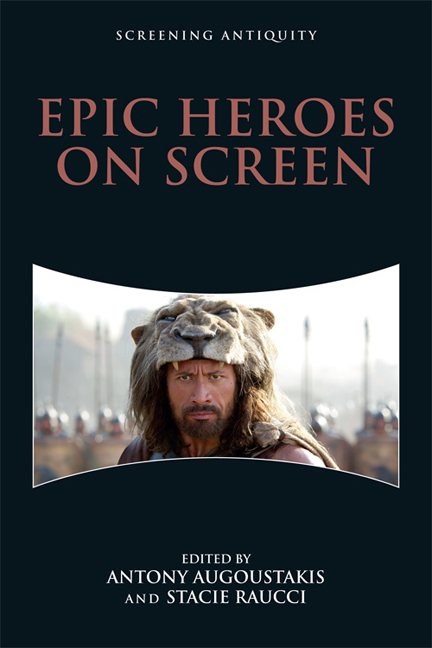4 - Heroes and Companions in Hercules (2014)
Published online by Cambridge University Press: 24 April 2021
Summary
INTRODUCTION
With the exception of his nephew Iolaus’ help against the Hydra in the second canonical labor, the Hercules of classical myth largely works alone in his heroic adventures. Cinematic depictions of Hercules during the 1950s and 1960s peplum or sword-and-sandal era largely follow suit, and more recent film and television reimaginings of the quintessential Greek mythological hero present him working with single sidekicks or very small groups at most. The 2014 Brett Ratner film Hercules takes another tack entirely. Based on the late Steve Moore's 2008 graphic novel Hercules: The Thracian Wars, the screenplay by Ryan Condal and Evan Spiliotopoulos features a large ensemble cast. While Dwayne Johnson plays the titular hero with charismatic star power and commensurate top billing, this Hercules works extensively with five companions. Each one has a complex relationship with mythological precedent and modern adaptation, and together these six form a tightly knit band of adventurers verging on adoptive family. The heroic name and reputation of “Hercules” soon reveals itself as the composite, corporate identity of Hercules the individual and his comrades seamlessly cooperating as a unit. This new company both draws from heroic fellowships of classical myth and reconfigures them for an innovative original narrative.
STEVE MOORE's GRAPHIC NOVEL AS ADAPTATION AND SOURCE
Complex layers of reception are at work in the finished film. Brett Ratner directed from the script by Condal and Spiliotopoulos, who in turn adapted Steve Moore's graphic novel. In an interview in 2008, Moore spoke at length about the inception and execution of Hercules: The Thracian Wars for Radical Comics, giving valuable insight into his artistic vision and creative choices. Imagining “a grittier, more human Hercules, which played down the more mythological aspects and emphasized that of the warrior,” Moore framed group dynamics as the fundamental starting point of his adaptation: “Obviously a warrior doesn't fight alone, so my first job was to give him some companions.”
- Type
- Chapter
- Information
- Epic Heroes on Screen , pp. 60 - 73Publisher: Edinburgh University PressPrint publication year: 2018



